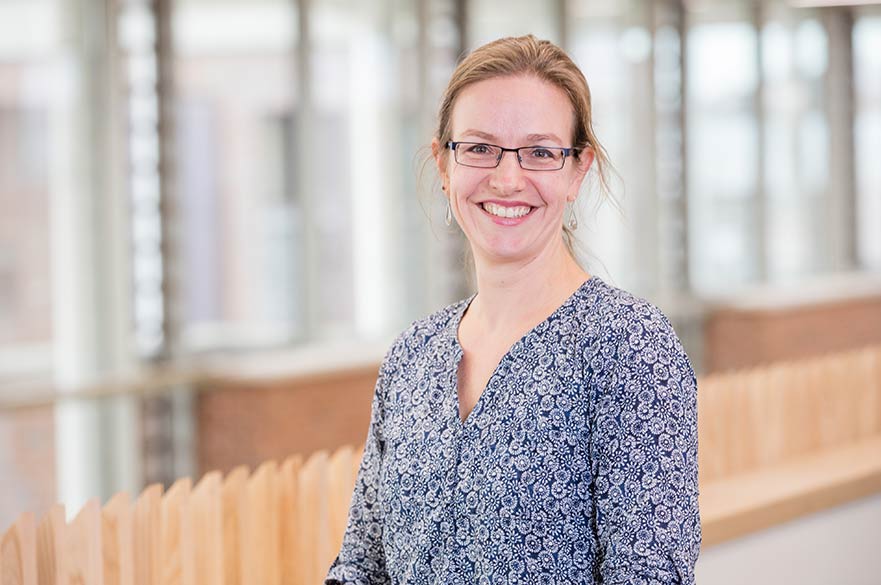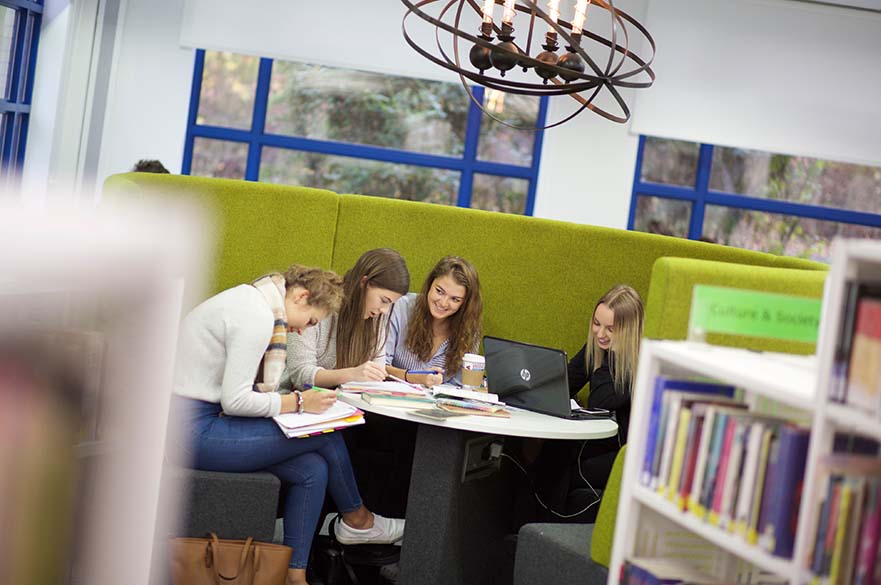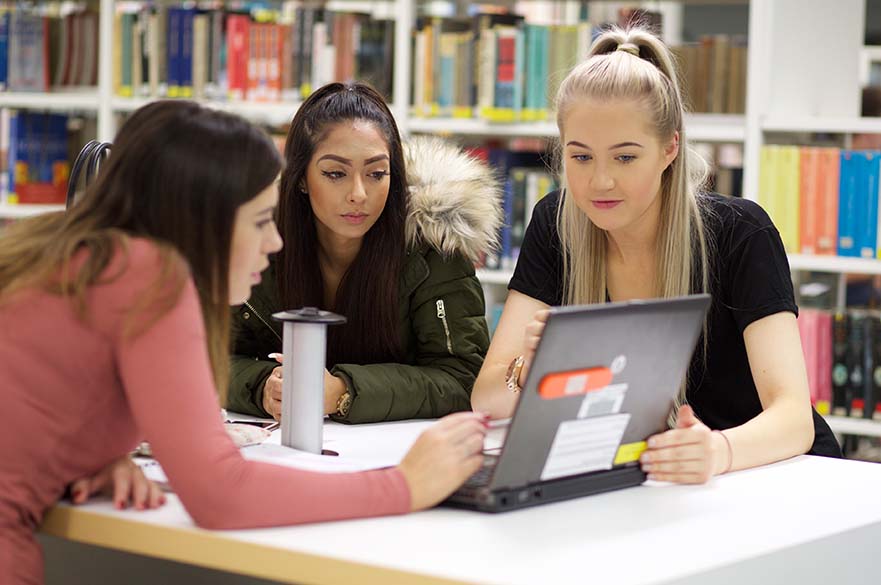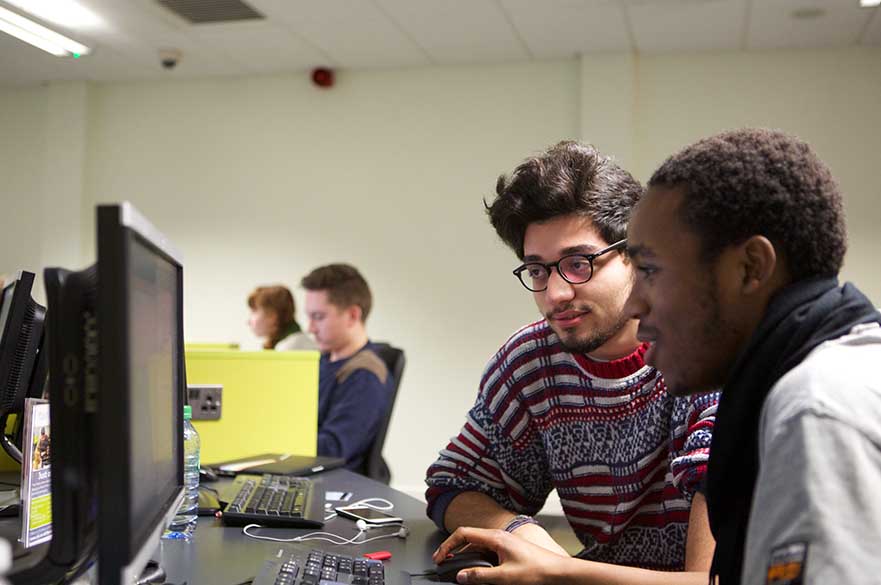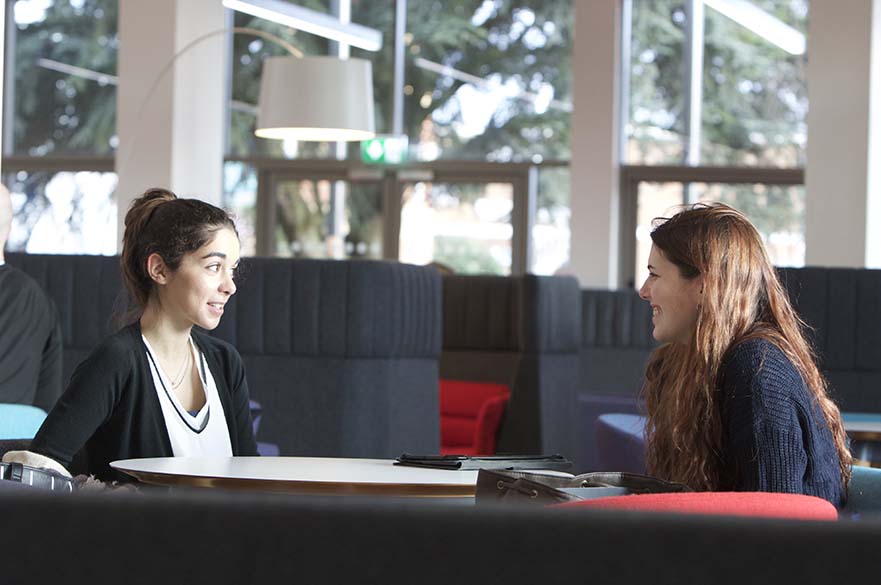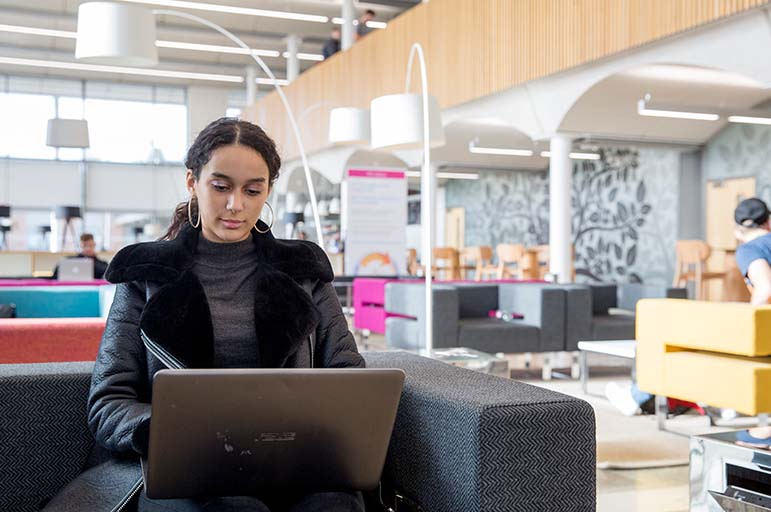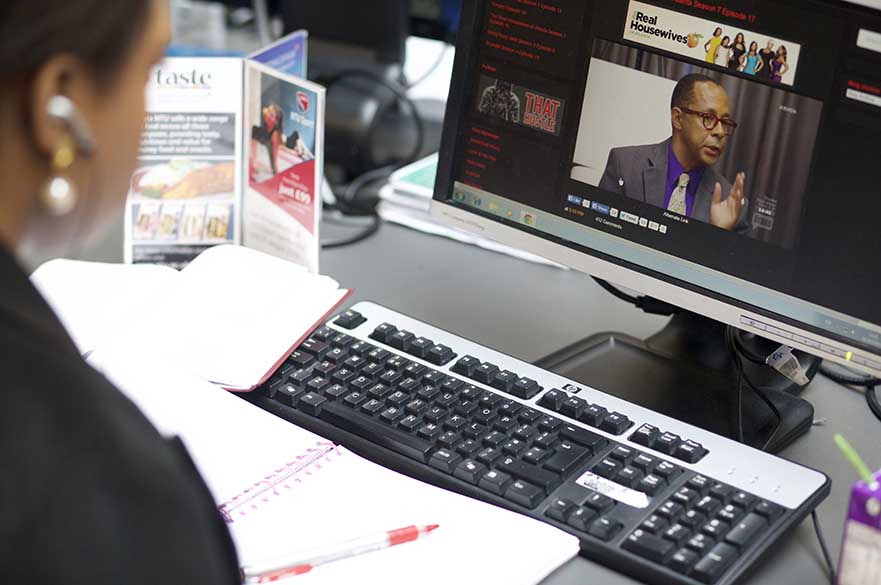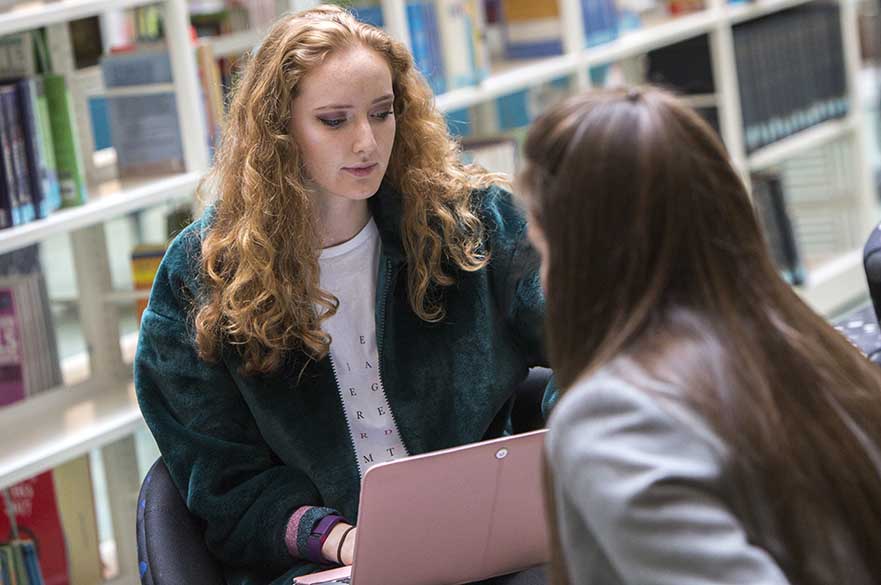This course is in Clearing
Offers from 80 tariff points
About this course
Communication is key to understanding the contemporary world and our place within it. To understand language is to empower ourselves for the challenges of the future.
In the 21st century, as professional work becomes ever more specialised and shaped by the demands of the digital world, there will be a corresponding need for the next generation of graduates to become highly skilled communicators with a capacity to speak and write effectively, eloquently, with cultural sensitivity and technological sophistication – across a range of different media.
The Communications and Linguistics degree will address these issues explicitly by developing your knowledge and understanding of the way in which linguistic processes and practices shape and continue to shape the fundamental contours of culture and society. You will study the syntactic, semantic and pragmatic dimensions of language, explore the globality of spoken and written English, as well as develop an understanding of the psychological, sociological, and political dimensions of contemporary communications processes and practices.
With these in focus, the course will offer an interdisciplinary approach to language and communication in order to analyse and explain the complex interrelations between social, political, institutional and technological dimensions of language in its multivariate forms, with a specific emphasis upon the way that an understanding of these is key to unlocking the employability potential of undergraduates in the Humanities for future, high skilled, professional roles.
What you’ll study
Each year you’ll study a number of core modules from the lists below and you’ll have the opportunity to select from a range of optional modules to give yourself a more specialised pathway, depending on your interests.
In the second half of Year Two you can take your learning into your own hands and choose an extended work placement, learn at one of our many partner institutions worldwide, or continue to study here with a wide range of interesting optional modules to choose from.
Work-like experience
Work-like experience is embedded throughout your degree, ensuring that you are given multiple opportunities across three years to develop your career goals and build the skills and experience needed to achieve them. These embedded work-like experience opportunities are much more than a placement, and ensure that you develop the skills and competencies that employers demand. You will take part in a minimum of 240 hours of work-like experience during your course, with the option to take an extended 10-week work placement in your second year.
What does work-like experience mean?
Work-like experience defines a wide range of activities which will build your skills and hone your confidence to prepare you for a professional career after graduation. You will be given opportunities to engage in client-led projects, volunteering, consultancy, professional development, vocational training, project management and team work. You will expand and enhance your creative and communications skills through practical projects, producing podcasts and videos, organising campaigns, curating social media content and visual media. This rich and diverse experience will ensure that you graduate with the skills and confidence to thrive in your own career path.
Transformation modules
Each year you will take a core collaborative module. These modules are linked and will build on each other to ease you into University life, support you with mentoring and personal tutoring, begin your professional development, and expand your horizons with collaborative projects and assessments both within your subjects and wider afield.
Core modules
Understanding the Communications Revolution
Explore the dynamics of digital culture which underpin the ‘communications revolution’. You’ll examine a range of media technologies and creative industries centred on the internet explosion, which together have arguably transformed the nature of life in the 21st century. And you’ll be asked to consider some of the key questions – about ownership, power and control - which accompany these changes.
Psychology of Communication
This module is designed to demonstrate the centrality of communications, not just to the functioning of society, but also for the very constitution of who we are as individuals. Based within, but by no means contained by, the field of Social Psychology, it looks at how people communicate with one another both verbally and non-verbally. It also considers the role of both conscious and sub-conscious processes. Other key topic areas include the arts of conversation and persuasion, the psychology of leadership, group dynamics and intergroup relations.
Morphology and Syntax
With language, we are able to express almost anything we want, and a large part of this is because languages have a grammar. In this module, you will learn the fundamentals of how to analyse the word and sentence structure of languages. You will start each topic by looking at English, and then begin to explore how languages from around the world differ from and are similar to each other. Also, you will look at the applications of grammatical analysis, including in the study of child language and computational linguistics.
Semantics and Pragmatics
In this module, you will explore meanings in language and communication. Building on first semester modules, you will examine literal and implied meanings in the relationship between what is said and what is meant. You will answer questions such as what meaning is as it relates to words and sentences, and how meaning works in context. You will also explore essential notions of semantics and pragmatics, such as deixis, politeness, and speech acts. Broadly, the first half of the module will consider semantics and then move to pragmatics in the second half.
Transformation: Agency and Self
This first-year module introduces you to interdisciplinary study with a focus on how the humanities help us to understand what is means to be human from different disciplinary perspectives, providing you with opportunities to explore and make connections between your subjects. The module introduces the role and value of the humanities to contemporary society. It also encourages you to better understand, and reflect on, your own place within your course and on your academic, personal, and professional development as you transition to higher education. In doing so, the module develops your key academic skills, introduces NTU support, and helps to create a sense of community and belonging for students studying courses in Joint Honours Humanities. For this module you will be assessed through a creative project based on a live brief, and a piece of reflective writing.
Optional modules typically include - choose one
Journalism and Promotional Cultures
Your introduction to the field of professional media communications. By looking at debates around fake news, the operations of propaganda and controversies around celebrity culture, you will develop a combination of theoretical insights and practical skills, which will hep you produce a PR campaign around a person of your choice.
Language, Society and Culture
Examine language beyond the level of the sentence, including both spoken and written discourse. You will learn how to analyse language, engaging with both the producers and users of texts. You will learn the basis of discourse analysis and explore why texts are structured and created to achieve different purposes in society.
Core modules
Problems of Language
Adopt the role of a consultant operating in areas such as market research, activism or language learning to respond to client briefs themed around prominent social issues such as equality, diversity & inclusion and sustainability. In doing so you will learn about the various methods of data collection in applied linguistics, such as recording and transcribing conversational data, designing questionnaires, carrying out interviews and conducting online data collection. You will also explore ways of analysing such data so that you can include proposals for analysing data in the pitch to your designated client.
Explorations in Identity and Selfhood
This module looks at a range of psychological and sociological theories of identity and selfhood. Starting with our common sense understandings and a focus on 'personality', it moves out towards more radical theories and arguments, which see identities as more contingent and de-centred.
Transformation: Agency and World
This second-year module enables you to develop your understanding and practice of interdisciplinary study through a focus on the role and value of the humanities for understanding and engaging with sustainable futures and the future of work, beginning with addressing challenges we face in the present and actions we might take. Interrogating local, national, and global sustainability frameworks from a multi- and interdisciplinary perspective, the module provides an opportunity for you to bring together both of your subjects to address questions of sustainability and enterprise in a variety of sectors and contexts. The module enables you to reflect on your own place within these debates and their relation to your academic, personal, and professional development. As part of the module all students will complete an 80-hour work placement experience. You will be assessed through a professional portfolio and placement report.
Optional pathways
Pathway 1: Extended work-like experience
Get the experience you need for after you graduate, and really understand how the things you study translate into the world of work with a work placement. Your highly experienced Employability Team will help you find a placement to suit your career goals from our huge network of companies, charities, institutions, and beyond.
Pathway 2: An international exchange
Travel the world, meet new friends, and have experiences you will remember for the rest of your life.
Our flexible curriculum has been designed to allow some amazing opportunities for you. Your second year of study is divided into two semesters, giving you the opportunity to take part in an international exchange. You could study with one of international exchange partners in Australia, Europe, USA, Canada, Thailand and many, many more.
Our dedicated team will support you in finding and arranging a suitable exchange. And don't worry about the cost, they will help you apply for any grants or loans you may need, as no one should miss out on the chance to broaden their horizons.
Pathway 3: Taught modules
Interdisciplinary optional modules typically include:
Intercultural Communication at Work
Gain the knowledge, skills and strategies to build your intercultural communication competence. Analyse and reflect on the impact of culture(s) on your values, assumptions, perceptions, expectations, and behaviours. Build successful verbal and non-verbal communication strategies in different intercultural settings.
People and Planet: pasts, presents, and futures
In this module you will develop an understanding of the human impact on the environment from the 15th Century to the present as a form of slow but sustained violence enacted against the planet. It will also explore how such long-term change can interact with social justice in the present day.
Communications optional modules typically include:
Journalism and PR: Critiques and Practice
This module explores the new ways of working and new modes of creativity in today's economy. Ranging across the fields of advertising, PR and journalism, you’ll interrogate the economic, psychological and sociological coordinates of the new forms of communication and media technology used in those industries, and you’ll examine the new types of creativity which have arisen as a result.
Media, Communication and Culture in East Asia
This module provides an insight into contemporary media development and cultural change in East Asia, placing this in the context of broader historical, economic and cultural debates. It will examine a wide range of media forms including print media, broadcasting, film and new media technologies, assessing their cultural impact in East Asian societies. It will explore contemporary issues of media development and policy and it will relate these to longer historical contexts.
Gender and Sexuality
Gender’ and ‘sexuality’ are familiar terms; however, they are also highly complex and contested. This module examines the ways these concepts have been theorised from a range of academic perspectives - including psychoanalysis, cultural history and feminist theory. It also orientates around three central questions: i) what is the substance of gender? ii) how do we become gendered? and iii) why do masculinity and femininity take the forms that they do and how do they change over time?
Linguistics optional modules typically include:
Communications Disorders
For many of us, understanding and producing language is something that happens easily. But for millions of people in the UK and around the world with a speech and language disorder, language is understood, produced, and learned differently. In this module, you will gain an understanding of a variety of medical conditions, including aphasia, dementia, cleft palate, schizophrenia, and learning impairments, and discover how their language differs from other people. You will not only consider the difficulties such people can face, but also what studying such people can tell us about all of our minds, brains, and bodies. You will also get an overview of how speech and language therapists aim to help people who have communicative difficulties.
Language, Inequality and Social Justice
Whether it’s racial abuse on social media, prejudice against regional accents in schools, or sexist advertising campaigns, discrimination is a social issue that affects us all in one way or another. This module examines how language can be used to both promote social justice and tackle prejudice and discrimination in a range of institutional and everyday contexts. This module will be particularly useful if you are looking to pursue a career in advocacy, human resources or journalism.
You may choose to take an optional year-long placement in Year Three, either in the UK or overseas.
You will be supported by our experienced Employability Team to source a suitable placement.
Core module
Major project
For your major project in your final year of your studies, you can choose to undertake a project in either one of your two Joint Honours subjects.
Communications Major Project
The Communications Major Project will provide you with a unique opportunity to choose a topic relevant to the field of Communications in which you have a special interest, and to explore it in depth over a sustained period of time. You can either produce a traditional, written dissertation, in which you will interrogate your chosen area of study and develop an argument of your own; or you can produce a media artefact (such as a screenplay, a podcast or a video), along with an accompanying critical analysis, in which you might explore your topic more creatively. Whichever format you choose, you will be supported throughout both by regular workshops, and by your own dissertation supervisor.
Linguistics Major Project
The Linguistics Major project offers you an opportunity to research a language-focused topic of your own choice in depth and in detail. This can take to form a standard long-form dissertation or another agreed format. You will be encouraged to collect and analyse naturally occurring language data, carry out different types of linguistic analysis and come to your own conclusions.
Humanities Research Project
The Humanities Research Project provides you with the opportunity to work with and further develop the combined knowledge and skills you have gained across your academic subjects to create a substantial and independent piece of interdisciplinary research. Supervised by academic staff, you will develop your own research topic, approach to the research and to the research outcome, delivered either through a 10,000-word dissertation or a substantial creative project with an accompanying 4,000-word essay. You are encouraged to approach your research project entrepreneurially; how might your research project contribute to future career opportunities and/or further study?
Transformation: Agency and Social Change
This final-year module challenges you to consider the role and value of interdisciplinary research through your academic subjects in advocating for and achieving meaningful social change at different scales. Building on your first- and second-year studies, you will conceptualise, develop, and deliver your own interdisciplinary approach to a live brief focused on an aspect of social change, considering the role of issues such as ethics, justice, power, rights and inequalities, reflecting on the role that is played, or could be played, by humanities disciplines in addressing these global issues. The module also provides you with an opportunity to bring together and reflect on your personal, academic and professional development throughout your degree. For this module you will be assessed through a creative project based on a live brief, and a piece of reflective writing focused on planning for your future beyond undergraduate study.
Communications optional modules typically include:
Self in Crisis: Power, Prejudice and Otherness
This module brings together debates which contend that, in various ways, contemporary selfhood is in a profound state of crisis. One part explores the idea that the very concept of the self – which, for so long, has sat at the very heart of the humanities - is itself problematic. Another considers the troubling of contemporary selfhood in more existential terms; that is, in terms of people’s actual lives and experiences. Here, special emphasis is placed on the status of mental illness and the roles of psychiatry and psychotherapy.
Advertising, Journalism and the PR Project
This module explores contemporary communication industries through the concept of ‘convergence’. This idea refers to the way in which individuals working in areas such as advertising, PR and journalism increasingly have to take on a variety of roles which cut across the traditional boundaries of each sector, and need to learn to use a variety of working practices and technologies as a result. The module culminates in you developing a PR project..
What's New: the Future of Media Communications
This module looks at innovations and challenges that face media communications professionals as they look to the future. Using practical assessments such as blog writing, producing a radio advertisement and making an audio slideshow, students will advance their media skills in preparation for future employment as digital, multi-media producers. You will examine the issues, ideas and debates which contemporary journalism and marketing have to engage with, such as the funding and accessibility of news on the internet, the nature and trends of popular content, new styles and forms of presentation and the blurring of fantasy and reality in digital communications.
Linguistics optional modules typically include:
Language and Health
We all aim to live a healthy life, and this module will explore the role that language plays in health-care settings, the communication of health topics, and our understanding of what “being healthy” means. You will explore questions such as: how do doctors and healthcare workers communicate effectively to patients? How does the media and other forms of texts influence our ideas of what is healthy? How do governments advise and encourage populations to live a healthier life? In doing so, you will learn practical tools to analyse language and images while also designing a health communication tool based upon academic research.
Forensic Linguistics
Examine language and the law, crime, and justice. You will review language in the criminal justice system, including the linguistic disadvantages that witnesses, victims, and suspects face in legal contexts. You will also look at the role of the forensic as expert witness and the different ways in which language analysts can provide investigative assistance to the police and reliable evidence to the courts.
Further information on what you'll study
Professor Natalie Braber, Professor in Linguistics gives us an insight into her subject, research and what makes Linguistics at NTU so special
"There’s a question that’s been doing the rounds recently: ‘what are arts and humanities degrees good for?’ Well, try living in a world that doesn’t have them; a world that doesn’t have people asking the kinds of questions we ask. Try and do anything without language, whether you’re listening, speaking, engaging or convincing. It’s almost impossible — and that’s why linguistics matters so much." Read more...
We regularly review and update our course content based on student and employer feedback, ensuring that all of our courses remain current and relevant. This may result in changes to module content or module availability in future years.
Don’t just take our word for it, hear from our students themselves
Your tutors
How you're taught
How will I learn?
Teaching takes a variety of forms and during your degree you will experience many different types of learning activities. Some of our modules are delivered entirely online, allowing you the flexibility to study at a time that is convenient to you. Other modules use interactive lectures and workshops that are supplemented by smaller group sessions, including:
- seminars
- tutorials
- problem-solving workshops
- training workshops
- hands-on practice
- group projects and presentations
- guest speakers
- field work
You will also be able to take part in lots of extra-curricular activities outside your course, including debating, research seminars, student challenges, Sustainability and careers training, sports, student societies and much, much more.
Study abroad in Year Two
You’ll have the option to take part in an international exchange at a partner university in the second half of Year Two. This will enable you to gain impressive international experience, and broaden your perspective and career ambitions.
You’ll experience other cultures, travel the globe and open your eyes to a world of opportunities. Our exchange partnership with a number of international universities enables you to live and study in another country in your second year. Find out more about international exchange and study abroad.
Learn a new language
Alongside your study you also have the opportunity to learn another new language. The University Language Programme (ULP) is available to all students and gives you the option of learning a totally new language or improving the skills you already have. Learning a new language can enhance your communication skills, enrich your experience when travelling abroad and boost your career prospects. Find out more about the University Language Programme.
Supporting you
If you’re struggling with a topic or require additional support or guidance, you can arrange to see your tutors in small groups or one-to-one, to discuss essay plans or to seek some specific academic guidance.
It is the nature of the subjects offered in the School of Social Sciences, however, that much of your time will be spent engaged in independent study. We recognise that this marks a change of culture from school or college, and we have in place a system of study support to help you adapt to this.
Assessment
Assessments take place within each module and the type of assessment will be related to what the module covers, and what you are learning in it.
Our approach to assessments is very diverse and although you will still produce written assignments like reports and essays many of our modules ask you to produce a creative element. These include blogs or social media campaigns, exhibitions, posters and other visual assessments, podcasts and videos. These are designed to ensure that you are building a portfolio of evidence and creative and communications skills to give you a head start in finding your perfect job after graduation.
Whatever the type of assessment, we will ensure that it will develop your skills, confidence and CV to fulfil both your academic and longer term potential.
How you're assessed
We use a varied and diverse range of coursework assessments to develop your skills and support your progress. These include digital projects, reviews, case-studies, essays, presentations and reports.
Our innovative approach to assessment means that in Year One you will develop and enhance a complementary set of key skills for success in second and third year, and throughout the degree the varied assessment pattern will enable you to engage with the past and prepare for your future through an exciting array of projects
Contact hours
If you’re struggling with a topic or require additional support or guidance, you can arrange to see your tutors in small groups or one-to-one, to discuss essay plans or to seek some specific academic guidance.
It is the nature of the subjects offered in the School of Social Sciences, however, that much of your time will be spent engaged in independent study. We recognise that this marks a change of culture from school or college, and we have in place a system of study support to help you adapt to this
Careers and employability
Your career development
This is a major part of the curriculum, recognising the importance of University study as a route into graduate level careers. We don’t expect you to have a target career from the outset, but we will support you to develop your career aspirations, and provide multiple opportunities for you to work towards this, during your degree.
The structure of your degree, the assessments that you will undertake, and the opportunities we provide are designed to help you develop key transferable skills and competencies demanded by employers. We work very closely with a range of employers, and many employers helped shape our degrees. Our courses provide lots of opportunities for you to develop your own links with organisations and potential employers.
Joint honours humanities students develop a wide range of complementary skills. These include key skills of communication, project management, analysis, creativity, digital skills, collaboration and leadership, with a strong emphasis on sustainability and inclusivity. Through this course you’ll become more confident and self-motivated, be able to work independently and in teams, and develop excellent time management skills.
Career destinations can include speech therapy, first and second language teaching and across the creative industries, including journalism, public relations and marketing.
Many graduates also choose to undertake further study on one of our masters-level courses or MPhil and PhD research degrees.
Campus and facilities
You’ll mainly be studying in the Djanogly building with access to facilities including a student kitchen and collaboration space.
NTU’s City Campus has everything you’ll need to stay busy between lectures. As well as the Boots Library and its beautiful roof garden, there’s our stylish Students’ Union building and two-storey, 100-station gym; a whole host of cafés, bars, restaurants and food outlets for every taste; our much-loved Global Lounge; performance and rehearsal spaces for musicians; and much, much more!
Take a few steps off campus and you’ll find yourself in the heart of Nottingham — England’s original ‘rebel city’. It’s one of the UK’s top 10 student destinations, and one of Europe’s top 25. Enjoy a booming indie arts scene, pop-up galleries, the nationally renowned Nottingham Contemporary, two A-list theatres, the iconic Broadway (voted one of the world’s top 100 independent cinemas by Total Film), and a constant rotation of events and exhibitions.
Take our virtual tour to get a real feel for the campus.
Here are some of the free services, student discount and benefits you'll get studying at NTU
We've carefully considered what benefits and services you need for your studies, so when you join NTU you'll get free printing and materials credits, access to our free WiFi, a copy of Microsoft Office, and can even borrow a laptop if yours is out of commission.
For life outside your lectures, you'll enjoy access to over 60 sports clubs and 130 student societies, discounted travel and bike hire, free language learning, award-winning student support and an entertainment programme which is second to none.
See all the benefits and free services you will enjoy as an NTU student.
Societies
Current students run societies in a range of Humanities and Arts subjects including History, Medieval, Film, Filmmaking, Philosophy, Politics and International Relations, and the Book society.
There are also a number of media channels which our students get involved in such as the NTU radio station FlyLive, our student magazine Platform, and TV station TrentTV.
Find out more about student societies at the Student Union website.
Entry requirements
This course is in Clearing
Looking for a place in Clearing? We are accepting application and would love to hear from you!
UK students
This course is in Clearing
Looking for a place in Clearing? We are accepting applications and would love to hear from you!
Clearing requirements
From 80 UCAS tariff points from up to 4 qualifications.
To discuss our entry requirements and see what we can offer you, call us now on +44 (0)115 848 6000. Alternatively, if you already have your qualifications, apply online via our Clearing Application form.
Preparing for results day? Beat the queue and sign up for NTU Priority for up-to-date information about all things Clearing. You’ll get an offer ahead of Clearing, subject to you achieving the required grades on results day.
To find out what qualifications have tariff points, please use our tariff calculator.
Additional requirements for UK students
There are no additional requirements for this course.
Contextual offers
If you don’t quite meet our entry requirements, we might be able to make you a lower offer based on a range of factors, including your background (such as where you live and the school or college you attended), your experiences and your individual circumstances (you may have been in care, for example). This is called a contextual offer, and we get data from UCAS to help make these decisions. We do this because we believe everyone with the potential to succeed at NTU should have the opportunity to do so, no matter what barriers you may face.
Meeting our entry requirements
Hundreds of qualifications in the UK have UCAS Tariff points attached to specific grades, including A-levels, BTECs, T Levels and many more. You can use your grades and points from up to four different qualifications to meet our criteria. Enter your predicted or achieved grades into our Tariff calculator to find out how many points your qualifications are worth.
Other qualifications and experience
NTU welcomes applications from students with non-standard qualifications and learning backgrounds, either for year one entry or for advanced standing beyond the start of a course into year 2 or beyond.
We consider study and/or credit achieved from a similar course at another institution (otherwise known as credit transfer), vocational and professional qualifications, and broader work or life experience.
Our Recognition of Prior Learning and Credit Transfer Policy outlines the process and options available for this route. If you wish to apply via Recognition of Prior Learning, please contact the central Admissions and Enquiries Team who will be able to support you through the process.
Getting in touch
If you need more help or information, get in touch through our enquiry form.
International students
This course is in Clearing
Looking for a place in Clearing? We are accepting applications and would love to hear from you!
Clearing requirements
From 80 UCAS tariff points from up to 4 qualifications.
To discuss our entry requirements and see what we can offer you, call us now on +44 (0)115 848 6000. Alternatively, if you already have your qualifications, apply online via our Clearing Application form.
Preparing for results day? Beat the queue and sign up for NTU Priority for up-to-date information about all things Clearing. You’ll get an offer ahead of Clearing, subject to you achieving the required grades on results day.
Additional requirements
English language requirements: See our English language requirements page for requirements for your subject and information on alternative tests and Pre-sessional English.
Additional requirements for international students
If you need help achieving the academic entry requirements, we offer a Foundation preparation course for this degree. The course is offered through our partner Nottingham Trent International College (NTIC) based on our City Campus.
English language requirements
View our English language requirements for all courses, including alternative English language tests and country qualifications accepted by the University.
If you need help achieving the language requirements, we offer a Pre-Sessional English for Academic Purposes course on our City campus which is an intensive preparation course for academic study at NTU.
Other qualifications and experience
If you have the right level of qualifications, you may be able to start your Bachelors degree at NTU in year 2 or year 3. This is called ‘advanced standing’ entry and is decided on a case-by case basis after our assessment of your qualifications and experience.
You can view our Recognition of Prior Learning and Credit Transfer Policy which outlines the process and options available, such as recognising experiential learning and credit transfer.
Sign up for emails
Sign up to receive regular emails from the International Office. You'll hear about our news, scholarships and any upcoming events in your country with our expert regional teams.
Getting in touch
If you need advice about studying at NTU as an international student or how to apply, our international webpages are a great place to start. If you have any questions about your study options, your international qualifications, experience, grades or other results, please get in touch through our enquiry form. Our international teams are highly experienced in answering queries from students all over the world.
Policies
We strive to make our admissions procedures as fair and clear as possible. To find out more about how we make offers, visit our admissions policies page.
